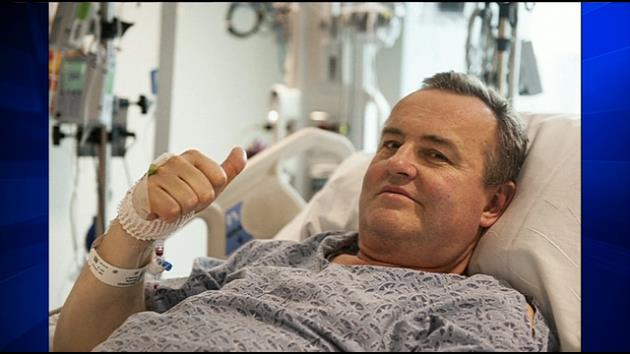BOSTON (AP) — A man who received the nation’s first penis transplant calls the operation a success and is going home.
Thomas Manning left Massachusetts General Hospital on Wednesday, three weeks after the grueling 15-hour surgery. The 64-year-old traveled with his mother and a family friend back to his home in Halifax, where he looked forward to a spaghetti dinner and a night in his own bed.
Related Stories:
- New penis recipient looks forward to being a ‘complete’ man
- 1st US penis transplant could raise hope for maimed soldiers
“We’re going to go home, just take it easy, have a nice, relaxing night,” Manning said as he prepared to leave his hospital room. “It’s almost all over. The worst of it is all done.”
After two follow-up surgeries, Manning said, he can urinate normally and he’s back to walking around. Sexual function is still months away, though, and reproduction won’t be possible because he did not receive new testes.
Manning, whose penis was amputated after he was diagnosed with penile cancer in 2012, never married and has no children.
When he described looking under the bandages for the first time, he became emotional. He still has dozens of stitches, and the swelling has yet to subside.
“It took me a few days to look at it, so confidence comes and goes,” he said, blinking away tears. “It’s one of those things that, if you look at it, it doesn’t look too good.”
But Manning is optimistic that he’ll make a full recovery in the coming months and that his body will accept the transplant. Through it all, Manning said he hasn’t felt any pain from the surgery.
“I got the A-Team here,” he said. “They’ve been taking care of me like you can’t imagine. I’m recovering no matter what they do to me.”
Manning is the third man in the world to receive a new penis, following transplants in South Africa in 2014 and China in 2005.
The procedure could benefit cancer survivors, accident victims and wounded soldiers. By sharing his story, Manning said he wants to give others hope in the operation.
Soon after his amputation, Manning started asking his doctor about the possibility of a transplant. When he was chosen and arrived at the hospital in May, it still felt as though he was just a local guy getting treated at the local hospital, he said. Only last week, lying in his hospital bed, it had finally sunk in that he was the first in the U.S. to get the procedure.
“I didn’t think too much of it, and then it hit me that I was the only one,” he said, his voice faltering. “That’s when it hit me.”
Copyright 2024 The Associated Press. All rights reserved. This material may not be published, broadcast, rewritten or redistributed.

